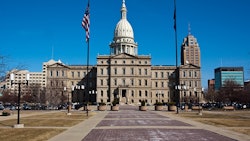
A federal lawsuit filed in Oklahoma suggests that the state’s Farm Service Agency director has been misleading prospective hemp farmers about the legality of the plant.
Equitable Organic Ventures is seeking to contract with about 20 farmers who “desire to cultivate hemp” for the company. EOV is working in conjunction with an unnamed higher education institution in Oklahoma.
Scott Biggs is the executive director of the Oklahoma division of the Farm Service Agency (FSA), and he is being accused of threatening farmers and deterring them from participating in any hemp cultivation program, despite the recent passage of the 2018 Farm Bill and despite Oklahoma enacting an industrial hemp pilot program (under the guidance of the 2014 Farm Bill) last year. The state’s program “allows universities, or subcontractors, to cultivate industrial hemp for research and development purposes.”
Because USDA officials and lawmakers are still hammering out the details of a federal regulatory structure for hemp, the market remains under the legal auspices of the 2014 Farm Bill and its pilot programs.
EOV and its higher education institution partner intend on participating—with the contracted help from Oklahoma farmers.
But not so fast, Biggs has countered.
“Biggs has repeatedly and unilaterally communicated to FSA employees statewide, as well as inquiring farmers, that if they enter into a contract with EOV, or if they plant even one hemp seed, they will be subject to losing their existing farm loans,” the lawsuit states. (Biggs’ agency provides farmers with loans, crop insurance and other benefits.)
EOV began approaching Oklahoma farmers in March and April 2019, seeking contracts with those interested in growing hemp. “In abundance of caution,” according to the lawsuit, “all farmers were directed to contact FSA regarding their participation in the Oklahoma Hemp Program to assure the farmers there would be no negative implications for their participation with EOV in the program.”
One farmer, Jeff Dill, of Harmon County, wrote in a signed affidavit that a state FSA employee had insisted that he’d be facing penalties for getting involved in this enterprise. The employee told Dill that, were he to participate in this contracted activity, he “could be ineligible for all FSA programs.” The email also stated that he “could be subject to having all of [his] loans called and that anyone who was affiliated [with him] … would be subject to the same.”
In the lawsuit, EOV writes that FSA approval is not required under the Oklahoma statute governing its hemp pilot program—which is accurate.
EOV has an open request under the Freedom of Information Act for an email circulated by Biggs, which allegedly describes the agency’s approach to hemp farming: “[A]ll participants in the Oklahoma Hemp Program will be subject to having their FSA loans called, they will be denied new loans, and they will be subject to criminal charges.
Under federal law, any person “convicted under state or federal law of planting, growing, harvesting, or storing a controlled substance shall be ineligible for any USDA or FSA benefit.” And while the 2018 Farm Bill did remove hemp from the federal list of controlled substances, the state of Oklahoma has not done the same in its own statutes. “Marihuana” remains listed among Schedule-I substances, and the definition of that term includes “all parts of the plant, whether growing or not; the seeds thereof; the resin extracted from any part of such plant; and every compound, manufacture, salt, derivative, mixture or preparation of such plant, its seeds or resin.”
According to state statute, “Any conflict between state and federal law with regard to the particular schedule in which a substance is listed shall be resolved in favor of state law.”
The underlying urgency for the EOV in sorting out this interpretation lies in the very planting season: The company and the farmers may miss out on the year’s worth of business and lessons learned, if Biggs and the state division of the FSA continue to block hemp production.


























